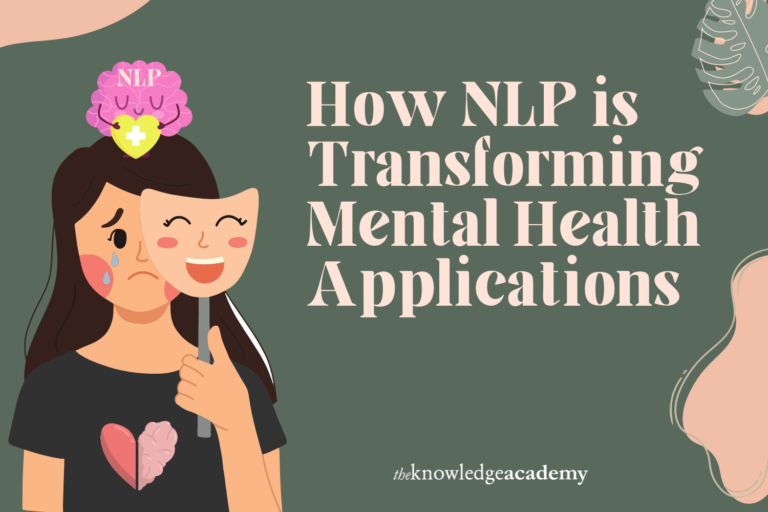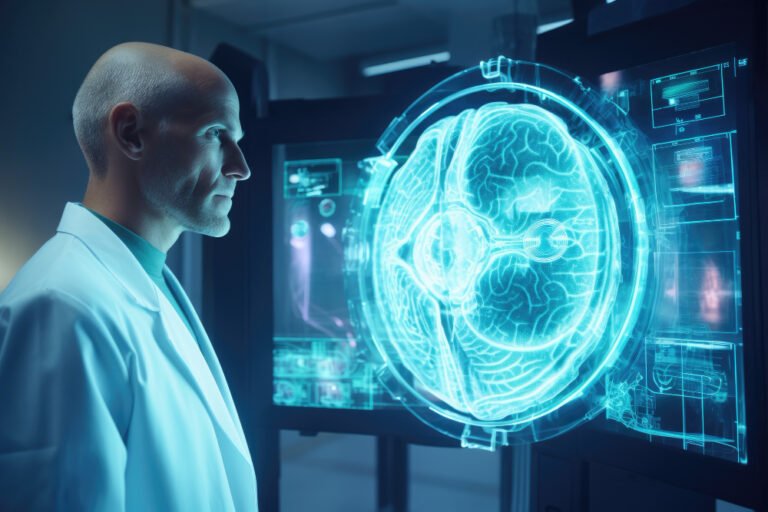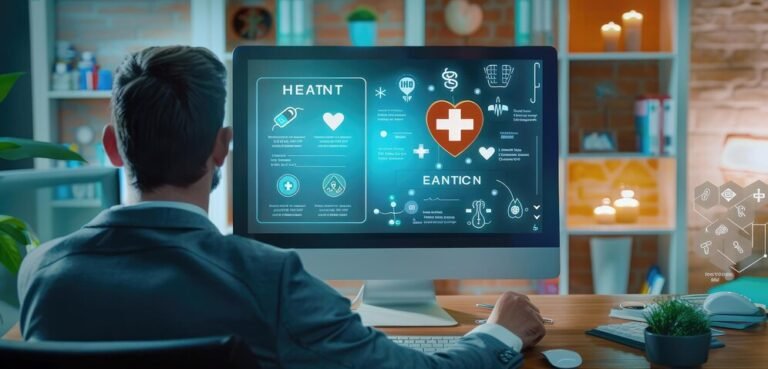How will Al affect the NHS?
The National Health Service (NHS), a pillar of British healthcare, is on the cusp of a major transformation driven by artificial intelligence (AI). But what exactly is AI, and how will it impact your next visit to the doctor? We’ll break it down in a clear and friendly way, without bombarding you with technical jargon.
Imagine AI as a highly skilled assistant for the NHS. It can analyze vast troves of medical data, scrutinize complex scans with laser focus, and even assist doctors in making diagnoses. Think of it like having a highly trained researcher by your doctor’s side, whispering insights and possibilities based on a wealth of knowledge.
The Current State of the NHS
The NHS, revered for its comprehensive healthcare services, faces numerous challenges. Overwhelming demand, resource constraints, and long waiting times are some pressing issues. Although various technologies are already in use, including electronic health records and telemedicine, these alone are insufficient to address the growing needs.
AI’s Arsenal: Boosting Efficiency and Accuracy Across the NHS
Let’s delve into the exciting ways AI is revolutionizing the NHS:
- Eagle Eyes for Early Detection: AI excels at identifying subtle patterns in mountains of data. This can be a game-changer for early disease detection. For instance, AI can analyze mammograms or other scans to pinpoint early signs of cancer, potentially saving lives through early intervention.
- Freeing Up Doctors’ Time: Repetitive administrative tasks like scheduling appointments or analyzing routine blood tests can be handled by AI. This frees up valuable time for doctors to focus on more complex cases and what truly matters – spending quality time with their patients.
- The Ultimate Research Assistant: AI can sift through mountains of research papers, keeping doctors up-to-date on the latest cutting-edge treatments and breakthroughs. This ensures doctors have access to the most current information when making healthcare decisions.
AI Applications in the NHS
AI in Diagnostics
One of the most promising AI applications in the NHS is in diagnostics. AI algorithms can analyze medical images, predict disease outbreaks, and even identify patterns that are often missed by human eyes. For instance, AI systems like IBM Watson Health are being used to detect cancer at early stages with remarkable accuracy.
AI in Treatment Plans
AI is also making waves in creating personalized treatment plans. By analyzing vast amounts of patient data, AI can suggest the most effective treatments for individual patients. In surgery, AI-powered robots assist surgeons in performing precise operations, minimizing risks and improving recovery times.
AI in Patient Management
Administrative tasks, which often consume valuable time, can be efficiently handled by AI. From scheduling appointments to managing patient records, AI can streamline many processes. Additionally, AI can monitor patients post-treatment, ensuring timely follow-ups and reducing readmission rates.
A More Personalized Healthcare Journey: AI Empowers Patients
AI isn’t just about doctors – it has the potential to empower patients as well. Imagine receiving personalized health reminders or tailored advice on managing chronic conditions like diabetes. AI-powered chatbots can answer your questions 24/7, providing basic medical information and easing anxieties by being readily available.
- Proactive Health Management: AI can personalize preventative healthcare by reminding you about upcoming screenings, flu shots, or medication refills.
- 24/7 Support: Imagine having a reliable healthcare companion at your fingertips. AI chatbots can answer basic medical questions, alleviate anxieties by providing initial information, and even connect you with appropriate resources.
The Road Ahead: Challenges and Considerations on the Path to AI Integration
While AI promises a brighter future for the NHS, there are some hurdles to address:
- Data Privacy: A Top Priority: Protecting patient data is paramount. Robust security measures are essential to ensure your information remains confidential. The NHS must prioritize data security to build trust with the public.
- Human Touch Endures: Let’s be clear, AI isn’t here to replace doctors. It’s a powerful tool to assist them, but the human element – empathy, compassion, and the ability to build trust with patients – will always be irreplaceable. AI can’t replicate the human connection forged between doctor and patient.
- Algorithmic Fairness: The effectiveness of AI algorithms hinges on the quality of the data they are trained with. Ensuring fairness and avoiding biases in AI healthcare systems is crucial. The NHS must be vigilant in addressing potential biases within AI algorithms to ensure equitable treatment for all patients.
- Ethical and Legal Implications: As AI becomes more prevalent, ethical and legal implications cannot be ignored. Establishing clear AI governance and regulatory frameworks is essential to ensure that AI applications are safe, effective, and fair. This involves continuous monitoring and updating of policies to keep pace with technological advancements.
- Training and Education: Preparing the NHS workforce for AI integration is crucial. This includes offering educational programs and resources to healthcare professionals to help them understand and effectively use AI tools. Training initiatives can bridge the gap between technology and clinical practice, ensuring smooth adoption.
- Public Perception and Acceptance: Public perception plays a vital role in the successful implementation of AI in the NHS. Educating the public about the benefits and addressing their concerns can foster acceptance. Transparent communication and demonstrable success stories can help build trust in AI technologies.
Embracing the Future: Working Together for a Healthier NHS
Integrating AI into the NHS is an ongoing journey that requires open communication and collaboration between healthcare professionals, policymakers, and the public. By working together, we can ensure a smooth transition and harness the power of AI to create a more efficient, accurate, and personalized healthcare system for everyone.
- Transparency and Communication: Open communication between healthcare professionals, policymakers, and the public is key. The NHS must clearly explain how AI is being used and address any concerns to build trust.
- Collaboration is Key: Bringing together different stakeholders – doctors, nurses, researchers, policymakers, and the public – is crucial to creating a robust and effective AI framework for the NHS.
Beyond the Hype: Setting Realistic Expectations for AI in Healthcare
It’s important to have realistic expectations. AI won’t magically cure diseases overnight. It’s a tool that will gradually improve healthcare over time. Think of it like getting fitter – it’s a marathon, not a sprint. We need to be patient and focus on continuous improvement.
- Gradual Progress: AI is a powerful tool, but it’s not a silver bullet. We should expect gradual improvements in efficiency, accuracy, and patient care as AI is integrated into the NHS.
The Human-AI Partnership: A Winning Team for a Healthier Future
The future of the NHS isn’t about robots replacing doctors. The collaboration between humans and AI forms a formidable partnership. AI can handle the heavy lifting of data analysis and administrative tasks, freeing doctors to focus on what they do best – providing excellent patient care. This includes:
- Building Rapport and Trust: The human connection between doctor and patient is irreplaceable. Doctors can leverage AI for improved diagnoses and information access, but they can then dedicate more time to building rapport, addressing patients’ concerns, and providing emotional support.
- Delivering Personalized Care: AI can personalize treatment plans based on a patient’s unique medical history and genetic makeup. Doctors can then use this information to tailor treatment approaches and create personalized care plans for each patient.
- Making Complex Decisions: AI can analyze vast amounts of data and identify potential treatment options. Doctors can then use this information, combined with their own expertise and experience, to make informed and personalized treatment decisions for their patients.
The Benefits for Everyone
The integration of AI into the NHS has the potential to benefit everyone:
- Patients: Experience improved efficiency, faster diagnoses, and more personalized care plans.
- Doctors: Become more efficient, have access to a wealth of data and insights, and dedicate more time to patient interaction.
- The NHS: Reduce administrative burdens, improve resource allocation, and potentially achieve cost savings.
Future Prospects of AI in the NHS
Looking ahead, the future of AI in the NHS seems bright. Emerging technologies like quantum computing and advanced robotics promise even greater advancements. The long-term vision includes a fully integrated AI system that enhances every aspect of healthcare delivery, from prevention to cure.
Join the Conversation: Your Voice Matters
As AI continues to evolve, so will the conversation around its use in healthcare. Let your voice be heard! Share your thoughts and concerns with policymakers and healthcare providers. Remember, the NHS belongs to all of us, and by working together, we can ensure a healthier future for everyone.
Below are several methods to engage:
- Engage with Public Consultations: The NHS often holds public consultations on new policies and initiatives. Make sure your voice is heard by participating in these consultations.
- Talk to Your GP or Local MP: Discuss your thoughts on AI in healthcare with your doctor or local Member of Parliament (MP).
- Stay Informed: Stay up-to-date on the latest developments in AI healthcare by reading reliable news sources and attending relevant public events.
By working together, we can ensure that AI is used responsibly and ethically to create a better future for the NHS and everyone who relies on it.







